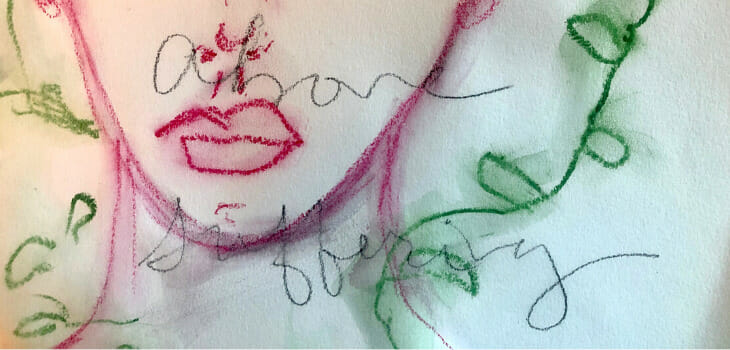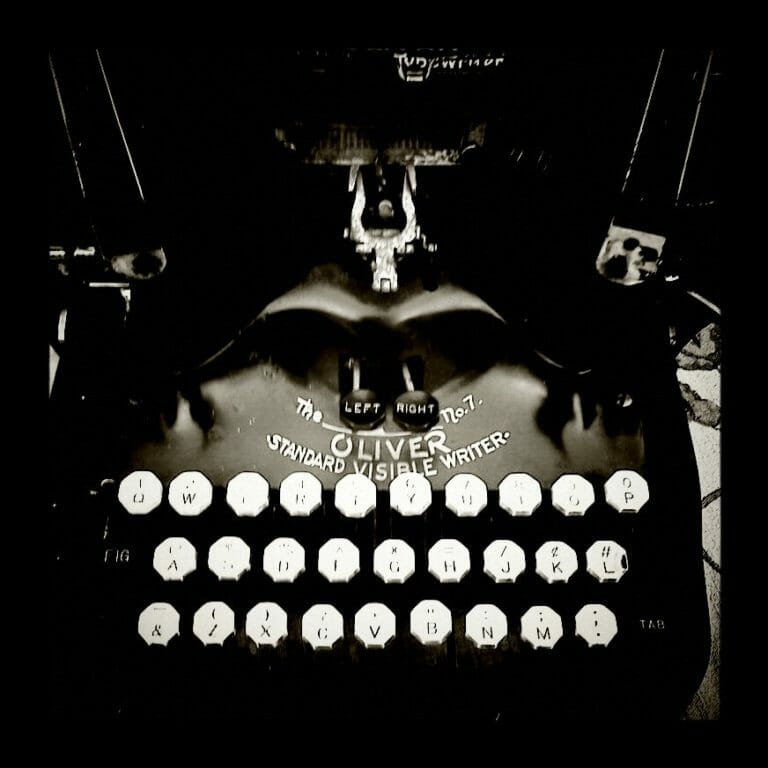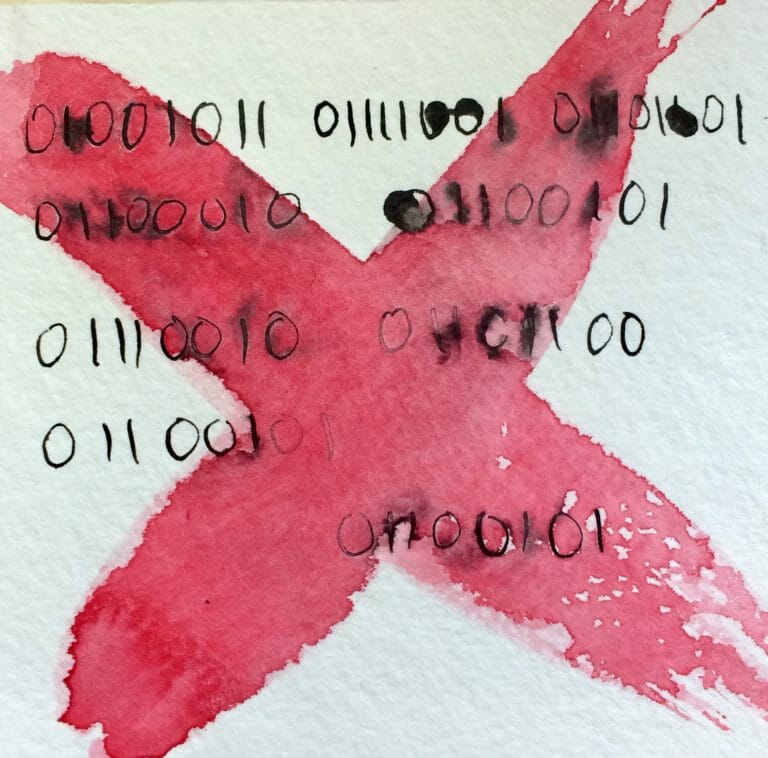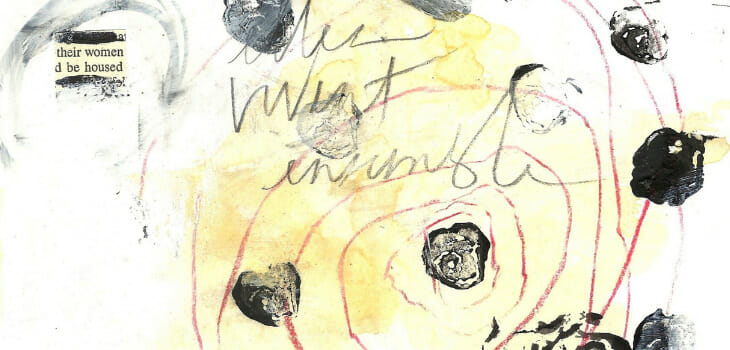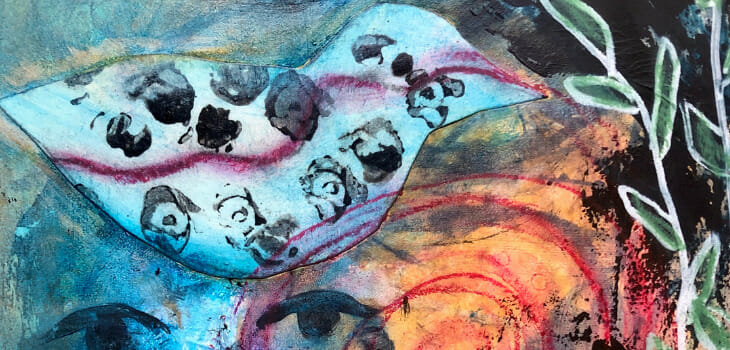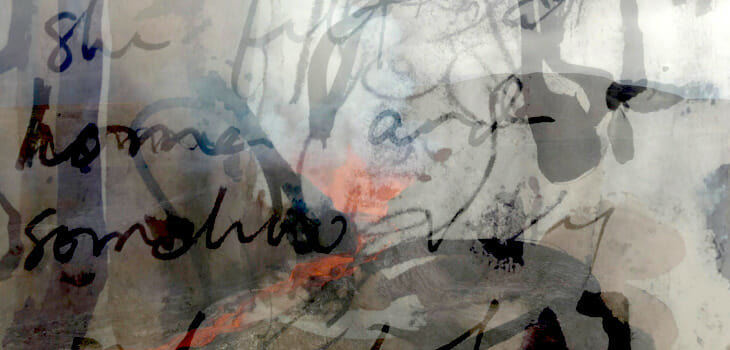Unbridled Expression with Kymberlee della Luce Transcripts: The Value of Poetry as Protest and Ending Cultural Gaslighting
Please enjoy this transcript from The Value of Poetry as Protest and Ending Cultural Gaslighting!
In this episode, I reveal some inspirations and talk about the value of poetry as protest, the worth of women and mothers, and how the myths of Henry David Thoreau and Adam Smith support cultural gaslighting.
You can subscribe on Apple Podcasts, Spotify, RSS, Overcast, iHeart Radio, Amazon Music, or wherever you listen to podcasts.
legal stuff
Before you partake, please read the below, which applies to every transcript.
Kymberlee della Luce owns the copyright in and to all content in and transcripts of the Unbridled Expression with Kymberlee della Luce podcast, with all rights reserved, as well as her right of publicity.
WHAT YOU’RE WELCOME TO DO:
You are welcome to share the below transcript (up to 500 words) in media articles (e.g., The New York Times, Washington Post, The Guardian), on your personal website, in a non-commercial article or blog post (e.g., Medium), and/or on a personal social media account for non-commercial purposes, provided that you include attribution to “Unbridled Expression with Kymberlee della Luce” and link back to the kymberleedellaluce.com/podcast URL. For the sake of clarity, media outlets with advertising models are permitted to use excerpts from the transcript per the above.
WHAT IS NOT ALLOWED:
No one is authorized to copy any portion of the podcast content or use Kymberlee della Luce’s name, image or likeness for any commercial purpose or use, including without limitation inclusion in any books, e-books, book summaries or synopses, or on a commercial website or social media site (e.g., Facebook, Twitter, Instagram, etc.) that offers or promotes your or another’s products or services.
This is Unbridled Expression and I’m your host Kymberlee della Luce. Every Wednesday we talk about art culture creativity and whatever else we’re curious about. Thanks for listening and if you like it, please do subscribe and share. Hello everyone this is Kymberlee. Today’s show is going to be pop poppin about poetry and i’m excited to share! So it’s all poetry today. uh and it’s well, it’s not all poetry. It’s poetry and Feminism. Feminist poetry I guess I would say. I was very inspired by the final closing episode of Dickinson last week and saw so much of myself in her, especially on the last on the last show. She’s talking to the flowers and talking to the bees and just really connected, you know?
My favorite people are connected that way including myself. Yeah I said it. I like that about myself and I love it when people feel and express their connection to the life around them and so often the people that do that in my life are not just women but people who are very connected to the
feminine to the all-encompassing sort of juicy, flowing aspects of life that that the, uh, you know, immanent—the indwelling parts of life and the poetry that I love tends to be connected in that way as well so that’s why poetry. Inspiration. Um a few years ago my son read this book by Fridrick Erlings called Boy on the Edge. It’s a beautiful book—I highly recommend it—and in it he says, “It’s important to spread poems over all the places where something bad has happened,” and that really speaks to me. It spoke to me then it speaks to me now in terms of how it is that poetry makes me feel better. How it is that if it doesn’t make me feel better because sometimes it is honest and crushing. At the very least it makes me feel connected and understood somehow.
That book made me feel inspired and poetry makes me feel inspired Dickinson’s life—Emily Dickinson’s life—makes me feel inspired. I was also very inspired by this poem from my daughter, Alexandra Variano, that I ran across. Alexandra is a writer and an actor and is so filled with life and deep seeing and knowing. She published this poem on her blog in 2018 and I ran across it the other day and so I thought I would share it with you. It’s so beautiful, it’s called “Blackberries”:
We rode off the beaten path
(As we tend to do),
Looking for nothing but peace and freedom from the bumpy road.
And as usual,
We found the sheltered secrets:
Plump,
Juicy,
Sweet,
Just waiting to be devoured.
This tradition is the trend of our time together.
We stumble endlessly upon beauty
And the fruits of the Earth.
Our winding conversations
Sweep us through infinite fields
Of crackling summer grass,
And carry us along on the soft sea breeze.
We wade in deep waters,
Dipping our feet into possibilities for the future –
Daring to dream –
To imagine something different.
I wouldn’t have it any other way
Between she and I, though.
She tirelessly pulls me
Through the fog of my limitations,
Transforming it into a glittering mist,
Magical and refreshing.
The shimmering spray
Paints me with a new coat that is brighter
And filled with wisdom.
It seeps through my skin,
Changing me on a molecular level,
And planting the seed of hope
For the next generation.
When I was young,
We used to pick blackberries with my Grandmother.
The scent was just as sweet,
But the vines more tangled.
The small, secluded field was our own Secret Garden,
Tucked away behind her humble, but homey house.
In this little corner of my Grandmother’s world,
The air was fresh and clear,
Not smogged by cigarette smoke
Or stale whiskey breath.
How could I know the depths of her dark history,
When my head was nestled among the brambles,
My hand outstretched,
As if they could carry me toward the plumpest prize.
I am part
Of a powerful matriarchal line.
We are a bunch of
Sassy,
Sharp-witted,
Soft-skinned women,
But we have each,
At some point,
Neglected our power.
We have silenced our own voices,
Turned the other cheek,
Rather than standing up
And speaking our truth.
My truth is buried beneath my skin.
It is in the lives
And experiences of
My Mother
and Grandmother
and Great-Grandmother
and the women before them I never knew.
I wish I had taken the time
To talk with my Grandmas,
To show interest in their lives –
Before they ended.
But for now,
I am blessed with the Light that is my Mom.
And I won’t take that for granted.
I won’t waste a second
Of our precious Time.
So I didn’t read that to you because of all the flattering things it said about me although it is nice. I read it because it so encompasses it so um elucidates the feeling that I have every day about being a mother in this world. What it doesn’t elucidate is sometimes how hard that could be (or maybe it does). Maybe that’s the unspoken truth that she mentions but this time, this time in human history
is a time when we are finding our voices and our power. Not just my matrilineal line but women and other marginalized folks are finding our voices and our power and it is gut-wrenching some days and it’s liberating and empowering other days.
You know I ran across this piece of paper this morning on my desk it’s like a little note I wrote to myself that I got from someone else. It says “does this empower, create, and uplift?” and that’s so subjective or seemingly so subjective. Often as women or people of color or any other marginalized person starts finding their voice there’s a an impulse from others to try to shut it down to try to smack it down and say, oh how dare you! don’t say that it’s, you know, hashtag not all men—that kind of thing.
That like, if we’re saying this thing happened to me, this thing happened to me, then the person that was responsible for making it happen wants to deny the truth of it because they—and let’s face it often he—doesn’t want to acknowledge it. Doesn’t want to acknowledge that that’s what happened, doesn’t want to acknowledge the pain that perhaps he caused or they caused and so if i’m speaking my truth, if my daughter is speaking her truth, if any poet anywhere feels that they have to hide their truth or sort of obfuscate their truth within words, you know, metaphors, so that it’s more palatable for other people that’s okay and maybe that is preferred sometimes, but I don’t think it always has to be that way. I think that we’re at a time when our words—whatever they ar—we know they have power and we know that we can push through and create positive change because of those words.
I love that poet Muriel Rukeyser writes: “What would happen if one woman told the truth about her life? The world would split open.” So let’s talk about the truth of a mother’s life. In the book Doughnut Economics by Kate Rayworth she talks about the the sort of—I’m putting this in air quote—the the “father” of modern day economics Adam Smith and how he was extolling the power of the market and noting that, “…It is not from the benevolence of the butcher or the brewer or the baker that we expect our dinner but he forgot to mention the benevolence of his mother Margaret Douglas who had raised her boy alone from birth,” (single mom, single mom, big ups for Margaret Douglas the mother of Adam Smith who had raised her boy alone from birth!) “Smith never married so he had no wife to rely upon nor children of his own to raise so at the age of 43 he began to write his opus The Wealth of Nations. He moved back in with his cherished old mum from whom he could expect his dinner every day but her role in it all never got to mention in his economic theory and it subsequently remained invisible for centuries as a result mainstream economic theory is obsessed with the productivity of waged labor while skipping right over the unpaid work that makes it all possible as feminist economists have made clear for decades.” So that’s a really good uh jumping off point or maybe just a really good connecting point for the overall conversation that we’re having on this podcast about the way that art is reflecting culture but maybe it’s not always reflecting the full spectrum of culture.
That’s what Iloved about “Dickinson”, that it showed the way that the mother was obsessed with, you know, doing the housework and how that’s where she got so much of her her sense of worth but how that, you know, towards the end of the show—spoiler you can fast forward if you haven’t watched it yet—towards the end of the show she became fatigued about that and started to question that and that there were a lot of questions being asked in the show including the way that Thoreau—when he was, you know, writing um at Walden Pond had a similar experience of having, you know, supposedly he was off in a cabin by a lake writing his his you know beautiful work and thinking his deep, deep thoughts while his mother and his sister would do his laundry and bring him food. So often the narrative, the narratives that we see get you know sort of carved up, right? They get like it’s like no we’re just gonna pretend like that didn’t happen and we’re just gonna imagine that perhaps you know these these people that are doing these wonderful things are just I don’t know magically making everything else happen I don’t know what everyone thought uh Thoreau was eating but um you know it’s not like he was talking about the contributions of the women in his family who were helping him and that’s that’s a real problem.
And you know it’s okay to talk about it right? Like that that’s how things are going to change but more importantly what I hope is that we can be inspired to be the protagonists in our own stories. I can say that as a mother I, you know, single mom raising my my children it would have been really nice to have the society around me my co-parent and just generally-speaking have compensation and acknowledgement instead of derision which is something that especially single mothers get . Or just, you know, just being ignored I mean that, that is the if we can’t see ourselves in the stories around us then we feel like we don’t matter and that’s just not true. We absolutely matter. We are
not here to be the, the, you know, sort of uh…supporting cast in the in the lives of all the the men and their heroes’ journeys that that is no—at least that’s now what I am here for and i’m imagining if you are listening to this podcast you might feel the same way.
And if you don’t feel that way please allow me to plant that seed of a question and what would it look like for your life to um be free for you to feel seen and understood. This morning my daughter gave me a thank you for the smallest little thing that I had done and I realized that t—just in that moment—it sort of healed something that, you know, her thanking me for making a phone call about something um healed the times when I’ve done all of the emotional labor and all of this behind the scenes work not only without compensation but also without recognition. And this time in my life seems to be bringing me more of that kind of recognition a little bit by little bit. It feels really good and so if you’re not getting that in your life I hope that you find your way to it. That’s my wish for you. It’s always my wish that people feel seen in their wholeness for how they wish to be seen for their contributions, for their unique spark in the world. That to me is the most amazing feeling in the world to have someone really see what you’re doing. And certainly we can do that for ourselves but you know we also kind of need it from others (at least I do).
Let’s also talk just for a moment about value as it relates to women and women’s art. In Michael Findlay’s book The Value of Art, he says “Like currency the commercial value of art is based on collective intentionality there is no intrinsic objective value no more than that of a hundred dollar bill human stipulation and declaration create and sustain the commercial value.” He also says, “All works of art have the potential for commercial value, social value, and essential value but none of those values are constant; all are enhanced or diminished by the fluctuating mores and tastes of different times and cultures. So okay, great Michael Findaly, I’m sure that’s true. I do like to argue these kinds of points, of course, because there’s a context that’s often missing when we talk about value. And sexism and misogyny are problematic as it relates to anything that comes from a woman being valued. Now i’m not the only person to talk about this but I am talking about it right now. How often do we see that you know that any story , any story being told especially stories for young people so often have it’s not just for young people what am I saying how often do we see stories being told where the main character is a man or a boy and all the supporting characters are, you know, people of color or women or the moms or whatever it is even someone like you know Billy Eilish when I Iwatched her—first of all please know that I love Billy Eilish ,this isn’t about Billy Eilish it is about the way that when i watched the documentary of her sort of come up and coming on Apple earlier this year they were following her around on her tour and you could see her—you know so she was homeschooled—you could see her family with her there and you could see how fatigued her mother was and why could I see that? Because I’ve experienced it.
Mothers get used in families and by society as free labor and we’re expected to take, you know, do the bake sales and, you know, cart kids around, be the taxIdriver and certainly not not every you know woman or mother does those things but often that’s the case and if you’re more inclined to do things that are maybe not quite as you know uh in the home um but you still want to be a mother it’s a it’s a difficult situation. So my point isn’t to be whining about being , about you know being a mother I have found being a mother very fulfilling as it relates to my children but being a mother in the United States at this time in human history has been fucking exhausting. There is no other way of saying it and I know I’m not the only woman going through this I know that there are women right now who are, you know, homeschooling their children or were during the pandemic or still are and are also working full-time or trying to take care of, you know, their their elderly parents uh all kinds of things are happening where women are just being run ragged and without compensation and certainly quite often without recognition. So I hope if you’re hearing this and you are a mother that you feel recognized even if only in this moment and if I have anything to say about it we will see a lot more representation of mothers doing all kinds of interesting things and being compensated and being witnessed and recognized.
So let’s keep talking a little bit about the poetry that comes from women and marginalized people in general but right now we’re talking about women Ihave a book called the art of protest by T.V. Reed R-E-E-D and the subtext of the book is “Culture and activism from the civil rights movement to the streets of Seattle”. the writer T.V. Reed says, “Compared to the drama of civil disobedience of sit-ins or the shock of tragic shootouts with the police the poetic ‘dramas of consciousness raising’ described in this chapter may at first sound quite tame…” and then just sort of goes on to talk about a few of the more dramatic things then they say, “…but to argue that poems are every bit as dramatic as these demonstrations or as confrontations with police is to make a feminist point—what counts as dramatic has often been defined in limiting ways based on male-centered visions of heroic performance if the goal is to change the world there is reason to believe that publicly performed or privately read poems have been a force as powerful as any other.”
I read that to you as an encouragement, as an invitation to create your poetry to write your poetry, to read your poetry, to share your poetry, to create poetry readings, to immerse yourself in your own creative process. It is a delight to behold what comes from within you and for me in my life finding that the people that have been welcoming of my spirit, of what comes through me and have have really celebrated my expression with me are that, you kno,w just absolute gold in my life and I Ihope that you have that in your life and if you don’t that you’ll find your way to it.
So we’re at this in between place between 2021 and 2022 and it’s it’s a time of fertility, it’s a time of, you know, we’re heading towards something—we’re we’re getting ready for our new beginnings and as I’ve been talking about on this podcast so far it’s it’s also a time for for some reflection. What’s working culturally and what is, you know, working within our own lives and I realize as I continue with this podcast that i’m keenly interested not only in unbridled expression of course but also finding a way to call out cultural gaslighting and to call in the voices of people who have been feeling shut down so that we can start feeling and being—being seen and heard—but also feeling seen and heard. And Ii’m going to read you this last poem which is one that I wrote way back in December of 2012. It’s just a as a point of light in this dark, wintery time. So here we go it’s called, let this news travel fast then.
news travels fast these days
(too fast)
we hear of a tragedy within minutes of the happening
powerlessness sets in
and outrage
(and deep sadness)
let this news travel fast then:
i awakened moments ago in a dark room
my babies are safe in their bed
the night sky is clear and the birch tree
is stripped clean from recent storms
the gift of starshine comes gleaming through the window
twinkling
(flirting a little)
***
I see people
checking their phones for instant updates
as though whatever is happening
on the other end of the pixelated universe
with their friends or the world
is within their control
perhaps we tune in
over there
to avoid the discomfort
of sitting with
the pain
and mess
AND GLORY
of right. here.
let this news travel fast then:
the world is beautifully tragic
it deserves our tears
and our love
(and so do we)
there are stars outside the window
waiting for us to flirt back
and people to hold tight
(and sometimes to let go)
May the time after this moment when you hear that poem—whenever that is for you—may it bring you,
may the time, the days ahead bring you whatever is most needed in your heart.
May it bring you truth, may it bring you joy, may joy find you until next time…
Unbridled Expression with Kymberlee della Luce is designed to stimulate and entertain you. Chocked full of thoughts, stories, questions, and advice on topics including everything from creativity, culture and relationships to the experience of being an unbridled woman and artist, it’s intimate, raw, and decidedly unbridled. New episodes every Wednesday (because, Mercury). Kymberlee truly hopes it ends up on your Spotify wrapped as your favorite podcast. Feel to reach out to her on Twitter or drop a comment below. To listen to any of the past episodes for free, visit this page.
